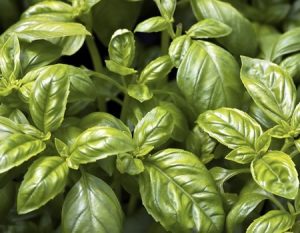Obesity is one of the biggest problems that is fast becoming a part of everyone’s life. The rising number of obese people around the world goes to show modern lifestyle dictates can unhealthy state of being.

Of course, various diets along with a regular, suitable exercise regimen can help to shed the excess weight, but a new study has found regular intake of African basil as a way to entirely curb the risk of obesity.
According to the study, African basil could be used as functional foods for the management of obesity and obesity-related hypertension.
Researchers that looked at the effect of chemical constituents of African basil on key enzymes involved in obesity and hypertension said its regular intake can help to prevent or ameliorate obesity and hypertension, without noticeable side effects
In the study, researchers found that it inhibited the most important enzyme in the digestion of dietary fat, and as such may retard the uptake of fat, and consequently, reduce weight and obesity.
Also, it retards the biological pathways in the body that contributes to development of high blood pressure, thus exhibiting preventive or therapeutic activity against obesity induced high blood pressure.
According to the researchers, the free radical scavenge effects of African basil also complement its preventive or therapeutic activity against obesity and hypertension.
The 2016 study in the Journal of Intercultural Ethnopharmacology involved Emmanuel Anyachukwu Irondi; Samson Olalekan Agboola; Ganiyu Oboh; and Aline Augusti Boligon.
Obesity, especially belly fat, is the most important risk factor for the development of hypertension and other cardiovascular diseases like stroke. Population-based risk estimates studies have indicated that no less than two-thirds of all cases of hypertension can be directly attributed to obesity.
Obesity and obesity-related hypertension have become a global public health burden; their incidence being comparable with those of diabetes mellitus and chronic kidney diseases.
Ocimum gratissimum, commonly called Tea bush, Daidoya ta gida (Hausa), Nehonwu (Igbo), Tanmotswangi-wawagi (Nupe) and Efinrin (Yoruba) have important culinary and medicinal uses. Its leaves are used as fragrance and flavouring agent in a variety of products including food, beverages, condiments and toothpastes.
It is also used by the Igbos in the management of the baby’s cord to keep it and wound surface sterile. It is also used in the treatment of fungal infections, fever, cold and catarrh. Similarly, African basil is used through West Africa to prevent malaria and convulsion and stomach pain.
Previously, researchers have found food items like avocado, chicken pea and broccoli protective against weight gain and hypertension. A study in the American Journal of Clinical Nutrition reveals that chickpeas and other legume seeds can aid in weight loss efforts even among people who aren’t intentionally reducing their caloric intake.
Japanese scientists discovered that a chemical in broccoli – already hailed as a ‘superfood’ for its cancer preventing properties – slowed weight gain in mice.
In the new study, scientists at Kanazawa University working with researchers compared mice fed with high-fat food supplemented with sulforaphane, a chemical compound contained in broccoli at relatively high concentrations, and others with high-fat food without sulforaphane in terms of their body weight.
The researchers found that the mice fed with sulforaphane exhibited a weight gain rate 15 per cent lower than that of the mice fed without sulforaphane.
They also had a 20 per cent reduction in abdominal fat, and lower blood glucose levels according to the study published in Diabetes, the journal of the American Diabetes Association.
Further research showed sulforaphane also accelerates adipose tissue browning, which induces fat burning.
Moreover, nutrient-dense natural foods such as oatmeal and potatoes that give good amounts of fibres are said to remove fat and other toxins from the digestive tract since it improves digestion and good bowel movement.
Oranges or citrus fruits in particular are known to help to lose weight. Oranges are high in vitamin C that has a fat burning quality. Studies have shown that it reduces the effectiveness of fat and promotes flushing it off the system.
Garlic has a good amount of allicin – a component that is known to burn body fats. Moreover, garlic is known to decrease cholesterol level in the blood thus reducing cases of hypertension. It can be easily added to dishes or taken raw.
Also, a squeeze of lemon or grapefruit could help to stay healthier and slimmer in the long run. A study published in the Journal of Clinical Biochemistry and Nutrition reveals that lemon may help reduce the obesity-causing effects of a high-fat diet while stabilising blood sugar levels.
Also, a study published in Nutrition & Metabolism found that consuming grapefruit or grapefruit juice before meals helped participants reduce weight and visceral fat.
Watermelon’s high liquid content makes it a good food to add to one’s diet when looking to lose weight. A study published in the Journal of Human Nutrition and Dietetics found that increased water consumption helped participants lower their total calories.
